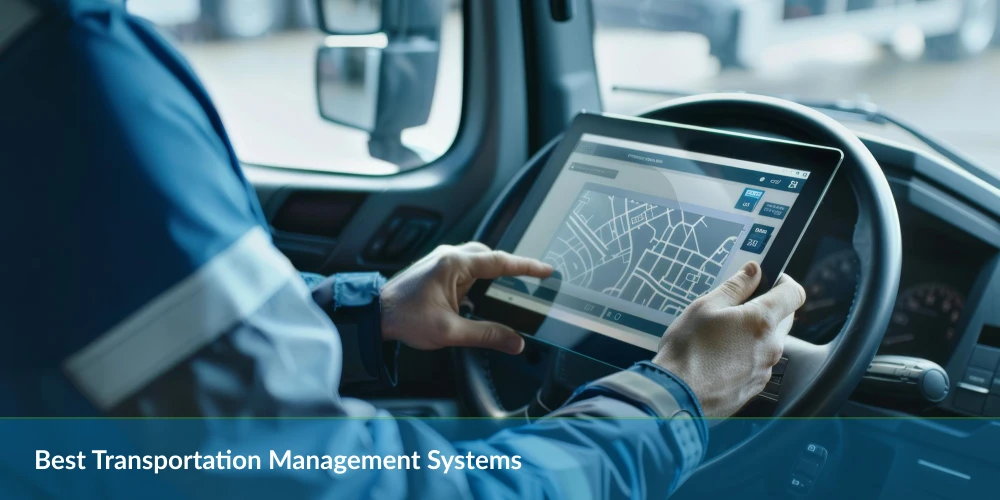Table of Contents
Are you looking to enhance your logistics operations and optimize your supply chain? The best transportation management system (TMS) can be your solution. The advanced software-integrated platform is designed to improve the movement of goods, making them essential tools for the logistics sector.

The best transportation management system provides businesses with enhanced visibility into their transportation operations, covering everything from scheduling and route planning to execution and delivery tracking. This comprehensive insight allows companies to monitor and manage their logistics processes more effectively.
By leveraging the capabilities of a robust transportation management system, businesses can streamline their logistics operations, reduce operational costs, and ensure faster, more precise product delivery. Investing in a TMS means better managing your supply chain and staying ahead in a competitive market.
The Central Nerve of Transportation Excellence: How TMS Elevates Logistics Performance
A robust transportation management system transforms transportation management by leveraging data analytics and integrative technologies, underpinning supply chain success. Continuous advancements propel TMS to the forefront of logistics innovation, providing companies with the edge in a competitive market. Efficiency increases, waste decreases, and customer satisfaction soars when a TMS becomes integral to transportation strategy. Connectivity and scalability become achievable goals, making TMS an indispensable tool for businesses aiming to excel in logistics and transportation management.
Discover the Essential Features Defining Top-Tier TMS
Leading Transportation Management Systems (TMS) revolutionize logistics by streamlining complex processes. This convenience emerges from various sophisticated features designed to optimize freight operations.
Automation of Freight Management Processes
Automated freight management stands out as a cornerstone feature. Systems with this capability expedite carrier selection, rate comparison, and load tendering tasks. Such automation enhances efficiency, minimizes human error, and swiftly adapts to changing conditions.
Real-Time Carrier Performance Tracking
Top-tier TMS offers real-time tracking of carrier performance. Users gain access to comprehensive data on delivery timings, service quality, and other critical performance metrics. Reliable data supports informed decisions and can significantly enhance operational transparency.
Advanced Shipment Consolidation Tools
Shipment consolidation tools play a crucial role. Optimizing the packaging and shipment process can reduce shipping costs and improve load efficiency. Users can consolidate freight through these tools, maximizing space and saving costs.
Multimodal Transportation Planning and Execution
Support for multimodal transportation planning and execution is a critical capability. Systems equipped with these tools provide users with platforms to orchestrate various transportation modes seamlessly, from full truckloads to rail, air, and sea freight, ensuring optimal route and mode combinations.
Integration Capabilities with Other Logistics Solutions and Services
A robust TMS seamlessly connects with other enterprise logistics solutions, such as warehouse management systems (WMS) and ERP platforms. This connectivity bridges informational silos, ensuring data coherence and continuous workflow across the supply chain management ecosystem.
By embracing logistics’ complexity, these pivotal features forge the path toward streamlined, reliable, and efficient transportation management. Fleet managers and logistics coordinators equipped with such sophisticated TMS capabilities are well-poised to elevate their freight management strategies to new heights.
Pro Tip: Leverage a TMS with real-time tracking and automated freight management to enhance efficiency, reduce errors, and ensure seamless multimodal transport planning.
Explore the Cost-Saving Benefits of TMS for Logistics
Transportation Management Systems streamline shipping processes, leading to significant cost reductions across various aspects of logistics operations. Logistics companies can achieve a more economical and reliable transportation workflow by deploying a robust TMS.
Reduction in Freight Expenses Through Optimized Carrier Selection
Choosing the most economical carrier for each shipment can dramatically lower freight costs. A TMS analyzes transportation data to recommend the most cost-effective shipping modes and carriers. Access to this comprehensive data makes negotiating better rates simpler, ensuring logistics companies are not overpaying for their freight needs.
Minimizing Administrative Overhead Through Automation
A key function of a TMS is automating repetitive tasks and reducing labor-intensive administrative work. This automation reduces shipment planning, documentation, and transaction management hours. Consequently, staff can focus on higher-level tasks, reducing costs and operational efficiencies.
Enhanced Decision-Making with Cost Reporting and Analytics
Logistics professionals leverage real-time data and analytics offered by TMS to make informed decisions that impact the bottom line. The access to detailed cost reports and trend analysis identifies areas for cost savings. As a result, companies can adjust strategies promptly and accurately to align with evolving market conditions and financial objectives.
Enhancing Supply Chain Visibility Through TMS
The advent of Transportation Management Systems ushers in an era of unprecedented transparency across the supply chain. By leveraging real-time tracking capabilities, businesses can pinpoint their freight’s location and status, ensuring a seamless flow of goods from origin to destination.
Real-Time Tracking of Freight Transportation
Deploying TMS allows logistics managers to observe freight movement as it happens. GPS technology and mobile connectivity feed crucial positioning data back to the system. As a result, potential disruptions can be identified and addressed promptly, thereby minimizing delays and ensuring timely deliveries.
Improved Forecasting with Data-Driven Insights
Data is the new currency of supply chain optimization, where predictive analytics play a central role. TMS analyzes historical data and current trends to forecast future conditions. This predictive capability allows companies to adjust their operations proactively, reducing the risk of inventory shortages or excesses and improving overall supply chain efficiency.
Monitoring of Supplier Performance and Compliance
TMS facilitates consistent monitoring of supplier performance, providing an objective measure of compliance with service-level agreements. Identifying suppliers who consistently meet, exceed, or fall short of expectations leads to informed decisions about partnerships. Compliance with industry standards and regulations is similarly tracked, preserving the integrity and reliability of the supply chain.
Navigating the Complexities of Route Planning with a Robust TMS
Transportation Management Systems transform route planning from a complex puzzle into a streamlined process. By leveraging dynamic routing, companies unlock substantial time and cost savings. A sophisticated TMS rapidly calculates the most efficient route for each delivery while considering numerous variables. The system accounts for delivery windows, driver schedules, and vehicle capacities, ensuring each journey is optimized for maximum efficiency.
Industry leaders acknowledge that multi-modal transportation presents its own set of challenges. A TMS stands out by providing a unified platform to manage these complexities. It enables seamless transitions between road, rail, sea, and air, negating the headaches typically associated with coordinating such intricate operations. Not just confined to planning, the TMS also adjusts for disruptions, quickly reconfiguring routes to keep goods moving smoothly across different transportation modes.
Another defining capability of a TMS is adapting routes in response to real-time traffic and weather conditions. The system ingests live data and alters routes instantly to avoid delays. When a traffic jam or storm threatens to hinder a delivery, the TMS recalibrates the journey, diverting drivers to alternative paths. Drivers and customers stay informed, with the system updating revised arrival times.
A TMS doesn’t just plan the route; it reshapes the entire delivery landscape. By navigating the often perilous realm of route management with precision and foresight, companies using TMS are poised to outmaneuver the competition and exceed customer expectations. Advanced route planning with a Transportation Management System is not just a matter of getting from A to B but doing so in the most efficient, reliable, and intelligent way possible.
Cloud-Based vs. On-Premise TMS Solutions
When selecting a Transportation Management System, companies weigh the benefits and limitations of cloud-based and on-premise solutions. Cloud-based systems offer remote accessibility, lower initial capital expenditure, and automatic updates. On-premise systems, conversely, provide complete control over the environment and potentially tighter security, and they may be preferred for heavily regulated industries.
Comparing the Benefits and Limitations of Both Solutions
Cloud-based TMS solutions often deliver scalability, enabling businesses to adjust resources as demand fluctuates. Service providers’ proactive maintenance reduces downtime, while implementation times are typically shorter than on-premise solutions. Conversely, on-premise systems may lead to higher upfront costs due to the need for dedicated hardware and IT staff but offer a higher level of customization for specific business processes.
Assessing Which Model Suits Different Types of Logistics Companies
Small to medium-sized enterprises may prize the flexibility and cost-effectiveness of cloud-based services. Larger businesses or those with strict compliance or data privacy requirements might lean towards on-premise solutions for enhanced control over sensitive data.
Security and Scalability Considerations for Services Hosted on the Cloud Versus On-Premises
Security in the cloud centers around strong data encryption and robust access controls, coupled with the expertise of cloud providers in mitigating risks. Scalability in cloud-based TMS solutions aligns with business growth, a process as simple as modifying a subscription plan. For an on-premise setup, scaling up often necessitates additional hardware purchases and potentially complex upgrades. Concerns around security for on-premise TMS hinge on the internal IT team’s capabilities to safeguard against cyber threats and manage physical server security.
- Cloud-based TMS: Enhances remote access, reduces capital costs, and provides scalability.
- On-premise TMS: Offers greater control, caters to customization needs, and suits businesses with stringent data control regulations.
Choosing between cloud-based and on-premise TMS will significantly influence operational efficiency, cost structure, and data security. Recognizing each model’s distinct advantages allows companies to select the match that reflects their business size, industry standards, and long-term growth strategies.
Unpacking the Necessity of a Scalable TMS for Expanding Enterprises
Growth-oriented businesses recognize that adapting to increased freight volumes and complexities is not merely an option but a necessity for sustained development. A Transport Management System that scales with the business avoids the pitfalls of stagnant logistical capabilities as demands intensify.
With a robust TMS designed to scale effectively, companies can expand their transportation services without being bogged down by significant capital expenditures. This adaptability proves financially prudent, ensuring resources are allocated judiciously to support expansion rather than to overhaul existing infrastructure.
A future-proof operation anticipates expansion and technological evolution. Selecting scalable TMS guarantees businesses are not left scrambling in the face of emerging demands but continue progressing with an already capable logistical backbone.
Advanced Analytics and Reporting in TMS
Data drives decision-making in the fast-paced world of logistics. With the best Transportation Management System, businesses access a goldmine of analytics and reporting tools. These tools allow them to transform numerical data into actionable strategies. Advanced analytics enable supply chain managers to map out scenarios, predict future challenges, and stay ahead of the competition.
Performance management thrives on customization. Modern TMS offers many customizable reporting features, ensuring different stakeholders can monitor KPIs relevant to their specific roles, whether on-time delivery rates or carrier performance; getting the right data at the right time is no longer a luxury but a standard feature of top-tier TMS solutions.
Beyond traditional reporting, predictive analytics take center stage. Through machine learning algorithms and historical data analysis, TMS can anticipate potential disruptions in the supply chain. Companies can thus pivot before issues escalate, ensuring reliability and efficiency in their transportation operations.
- Analyze patterns and trends in freight costs to identify saving opportunities.
- Use insights from past performance to optimize future route planning.
- Evaluate carrier reliability and punctuality to negotiate better rates or identify more dependable options.
- Assess the potential impact of external factors such as weather or traffic on shipping schedules. Proactive adjustments minimize delays.
Blending these capabilities, advanced TMS analytics augment the strategic portfolio of logistics professionals. Armed with a wealth of information, these professionals react to the present and shape the future of their supply chains.
The Impact of TMS on Customer Satisfaction
Transportation Management Systems directly affect how customers perceive the quality of service delivered by logistics companies. Precise delivery times and the consistent reliability of services have become less of a differentiator and more of a standard expectation in the logistics industry. As deliveries align with scheduled timelines, customer trust in the service provider strengthens, increasing customer loyalty and a higher likelihood of repeat business.
Not only does a robust TMS facilitate on-time deliveries, but it also plays a pivotal role in shaping customer interactions. Customers now receive real-time updates and transparent communication about their shipments, fostering trust and customer empowerment. Proactive notification systems within a TMS inform customers of potential delays, allowing them to make necessary adjustments rather than leaving them to deal with the consequences of unexpected late arrivals.
Error reduction is another tangible benefit of TMS that positively influences customer satisfaction. By streamlining processes and providing accurate documentation, TMS minimizes the chances of shipment delays attributable to logistical oversights. Reducing discrepancies directly leads to fewer customer complaints and establishes a foundation for high service quality. Customers who experience fewer issues are more likely to regard the service provider as dependable, further influencing their satisfaction and long-term business relationships.
- Delivery reliability bolsters customer trust.
- Transparent communication through TMS empowers and reassures customers.
- Reduction in errors from TMS implementation correlates with higher service quality perceptions.
Pro Tip: Utilize TMS’s advanced analytics and reporting tools to enhance decision-making, improve customer satisfaction, and reduce costs.
Compliance and Security Aspects in TMS
A renowned Transportation Management System must navigate intricate regulations across different regions and industries. Ensuring regulatory compliance in international logistics is not negotiable. Missing a regulation can have consequences, including fines, shipping delays, or worse, a complete operational shutdown. TMS solutions streamline these complexities and adapt to changing regulations, safeguarding uninterrupted transit.
Ensuring Regulatory Compliance in International Logistics
With businesses reaching global markets, the scope of compliance has broadened. A TMS simplifies compliance with international trade regulations, such as customs requirements, trade agreements, and hazardous goods handling. By providing updated information on international compliance standards, TMS enables shippers to prepare accurate documentation, like shipper export declarations and commercial invoices, ensuring that goods move across borders seamlessly.
Data Security Measures for Protecting Company and Customer Information
As cyber threats grow more sophisticated, data security remains a top priority. TMS vendors have implemented robust security measures such as end-to-end encryption, multi-factor authentication, and regular security audits. These systems protect sensitive company and customer information against unauthorized access and data breaches, which builds trust and ensures long-term partnerships.
Maintaining Audit Trails and Documentation for Accountability
Audit trails are vital in logistics, offering a transparent view of the transportation lifecycle. By maintaining comprehensive records and documentation, a TMS provides clarity and accountability. These records are crucial during audits and when discrepancies need to be investigated. They are the fingerprints of a product’s journey, facilitating traceability from the point of origin to the final destination.
- A TMS can automatically update with the latest tax rates and environmental regulations.
- High-level encryption is often employed to protect data at rest and in transit.
- Some TMS tools help in generating reports swiftly to comply with regulatory bodies.
- Automatic notifications and alerts in TMS help prevent oversights in documentation or compliance requirements.
Automation and AI in Modern TMS
Transportation Management Systems have evolved from mere tools for shipping and transportation to intelligent platforms underpinned by automation and artificial intelligence (AI). Integrating machine learning algorithms has led to significant enhancements in logistics processes. These algorithmic improvements allow TMS platforms to learn from historical data, optimize operations, and reduce human error.
Incorporating Machine Learning for Improved Logistics Processes
Machine learning algorithms analyze vast amounts of data to identify patterns and make informed decisions. This translates to better management of supply chain disruptions and enhanced logistics performance. Predictive analytics, a by-product of machine learning, helps anticipate potential delays and calculate the probabilistic outcomes of logistical decisions.
The Use of AI in Forecasting Demand and Planning Routes
AI stands at the forefront of proactive demand forecasting and route planning. Advanced TMS solutions harness AI to project future demand trends, leading to more precise stock levels and optimized transportation plans. Furthermore, AI-powered route planning minimizes delivery times and costs by considering real-time traffic data, weather conditions, and vehicle constraints.
Automating Repetitive Tasks for Operational Efficiency
Automation within TMS targets the elimination of repetitive manual tasks. Functions such as order entry, invoice reconciliation, and appointment scheduling now entail minimal human intervention. Such automation accelerates operations and limits the scope for errors, amplifying the overall efficiency of transportation management.
- AI has transformed transportation management, paving the way for more agile and responsive logistics operations.
- Real-time analytics provided by AI-driven TMS solutions play a critical role in strategic decision-making.
- Automation liberates human capital to focus on complex tasks that require human insight, furthering the growth and innovation in logistics management.
Anticipating Technological Trends and Their Impact on TMS
Technological trends shape the trajectory of TMS development. Artificial intelligence, machine learning, and predictive analytics are already elevating the capabilities of current systems. These technologies allow for more intelligent decision-making and predict future trends, enabling businesses to respond proactively rather than reactively. As these tools become more nuanced, their integration within TMS will yield more precise forecasts, optimized routes, and improved resource allocation.
The Role of IoT, Blockchain, and Other Emerging Tech in Logistics
The Internet of Things (IoT) enables real-time visibility and monitoring of assets, drastically enhancing transit tracking. IoT enables TMS to detect and respond to conditions like traffic, weather, and vehicle performance to optimize delivery times. Blockchain technology offers unprecedented transparency and security, making supply chain transactions tamper-resistant and facilitating trust among stakeholders. Adopting these technologies not only streamlines operations but also mitigates risks and enhances accountability at every stage of the supply chain.
Preparing for Future Challenges and Opportunities in Freight Transport
Adapting to future challenges and opportunities requires a thoughtful approach to incorporating new technologies. Autonomous vehicles and drones, still in their infancy, promise to introduce an era of unmanned logistics operations, reducing labor costs and human error. Moreover, as environmental concerns become more pressing, technologies enabling sustainable practices will be essential. This could include advancements that help reduce fuel consumption or initiatives for carbon offsetting powered by TMS data insights.
Choosing the Right TMS for Your Logistics Company
Decisions regarding Transportation Management Systems (TMS) heavily influence operational efficiency and profitability within logistics companies. As such, aligning TMS functionalities with your business requirements is critical to enhancing your company’s performance. Conducting a thorough evaluation of available TMS features ensures that the selected system complements your operational workflow and aids in attaining your strategic objectives.
Evaluating TMS Features That Match Company-Specific Needs
Selecting the optimal TMS begins with analyzing your company’s cargo handling, typical shipping volumes, and transportation modes. One must scrutinize each potential system for its ability to handle these elements effectively. A business that frequently engages in international shipping must ascertain that the TMS offers robust features for customs clearance and international trade compliance, whereas a company focusing on local deliveries may prioritize route optimization and last-mile tracking capabilities. A detailed assessment secures a beneficial match between the technology and your company’s requisites.
Assessing TMS Vendor Selection Criteria and Services
The selection of a TMS vendor extends beyond software capabilities. Service reliability, customer support, and the vendor’s track record in the industry are pivotal considerations. You should clarify the levels of ongoing support and training the vendor provides. Adequate vendor research encompasses staking out customer testimonials, asking for comprehensive demonstrations, and scrutinizing post-sale service agreements to confirm that you partner with a vendor whose services are as resilient as their software.
Ensuring That Your TMS Choice is Future-Ready and Offers Tech Support
Digital technologies innovate at a blistering pace, and choosing a TMS that can evolve with these advancements assures long-term benefits. Look for platforms with regular updates, scalability to grow with your business, and compatibility with emerging technologies like IoT and blockchain. Technical support is an anchor for any TMS deployment; therefore, confirming that the vendor offers immediate, reliable technical assistance cements your system as a durable asset. Prospective systems should demonstrate current effectiveness and the foresight to remain primary in an ever-shifting landscape.
- Select a system that can integrate smoothly with your existing technology stack, allowing a synergy between the TMS and other tools such as ERP or CRM systems.
- Factoring in the system’s analytics and reporting functionalities is essential, providing insights for data-driven decision-making.
- The chosen TMS should pivot effortlessly with your company’s growth trajectory, accommodating new business processes and expanding operational volumes without excessive upgrades or customizations.
Optimizing Operations: Selecting the Right TMS Vendor and Implementation Best Practices
Choosing a transportation management system (TMS) provider extends beyond evaluating technical features and software capabilities. Analyzing the provider’s credibility, customer service record, and support proves decisive for long-term operational success. A thorough vendor assessment ensures that the chosen system aligns with business objectives, scales alongside growth, and adapts to changing industry dynamics.
Long-term Partnership and Support from TMS Suppliers
Selecting a TMS supplier signifies the beginning of a strategic partnership. A supplier committed to continuous development and innovation contributes to mutual growth. Regular updates, adherence to industry standards, and responsive support services are essential for optimizing a TMS over time. When these aspects complement one another, they facilitate a robust and resilient logistics infrastructure capable of weathering market volatility and shifting regulatory landscapes. Forge partnerships with suppliers whose vision and commitment to progress mirror your own, thus ensuring that the TMS will evolve and scale as a core component of your business strategy.
Key Takeaways
- Enhanced Efficiency and Cost Savings: A robust TMS streamlines logistics operations by automating freight management, optimizing carrier selection, and reducing operational costs, leading to significant cost savings.
- Advanced Features for Improved Performance: Top-tier TMS solutions offer real-time tracking, automated freight management, shipment consolidation, and multimodal transportation planning, enhancing overall logistics performance.
- Increased Supply Chain Visibility: TMS provides real-time tracking and predictive analytics, offering unprecedented transparency and enabling proactive adjustments to improve supply chain efficiency and decision-making.
- Scalability and Flexibility: Cloud-based TMS solutions offer scalability and remote accessibility, while on-premise systems provide greater control and customization, allowing businesses to choose a model that fits their specific needs and growth plans.
- Integration of Automation and AI: Modern TMS platforms leverage automation and AI to optimize routes, forecast demand, and reduce manual tasks, resulting in more agile, responsive, and efficient logistics operations.
Conclusion
Selecting the best Transportation Management System is more than a mere operational decision; it defines the backbone of modern logistics operations. A robust TMS transforms the transportation management landscape by streamlining processes, enhancing supply chain visibility, and contributing to significant cost savings. Companies that leverage the strengths of an advanced TMS position themselves to meet customer demands with higher efficiency and precision.
For logistics businesses aiming to flourish, adopting a TMS that aligns with their operational needs and growth aspirations is non-negotiable. This synergy between organizational objectives and TMS capabilities ensures a scalable, secure, and compliant transportation management environment. Advanced analytics and sophisticated route optimization afforded by a high-quality TMS enable smarter decision-making that can lead to a substantial competitive advantage.
Acknowledging the complexities of multimodal transportation, the seamless integration of a TMS with other systems offers unparalleled control over logistics workflows. Furthermore, automation and AI-driven features embedded in modern TMS are revolutionizing the field by optimizing operations in ways previously unattainable.
Are you ready to elevate logistics operations and drive your business toward greater efficiency and customer satisfaction? Discover how a modern, tailored Transportation Management System can revolutionize your transportation processes.
Contact NetworkON and see firsthand how our TMS solutions can optimize your supply chain, reduce costs, and enhance customer service. Our experts are here to help you find the perfect fit for your business needs and guide you toward long-term success.
Get in touch with us now & take the first step towards smarter logistics today!
Frequently Asked Questions
What is a Transportation Management System (TMS)?
The best Transportation Management System (TMS) is an advanced software platform for managing and optimizing transportation operations. It helps businesses plan, execute, and track the movement of goods, streamline logistics processes, reduce costs, and enhance supply chain visibility.
What are the key features to look for in a top-tier TMS?
Key features of a high-quality TMS include:
Real-time carrier performance tracking.
Automated freight management.
Advanced shipment consolidation tools.
Multimodal transportation planning.
Seamless integration with logistics solutions like Warehouse Management Systems (WMS) and ERP platforms.
How can a TMS help reduce transportation costs?
A TMS helps reduce transportation costs by optimizing carrier selection to find the most cost-effective options, automating administrative tasks to reduce labor costs, and providing data-driven insights for better decision-making and cost reporting.
What are the benefits of cloud-based vs. on-premise TMS solutions?
Cloud-based TMS solutions offer remote accessibility, lower initial capital costs, and scalability, making them ideal for dynamic businesses. On-premise TMS solutions provide complete control over the environment, enhanced security, and customization, making them suitable for companies with strict regulatory requirements or complex needs.





0 Conversations